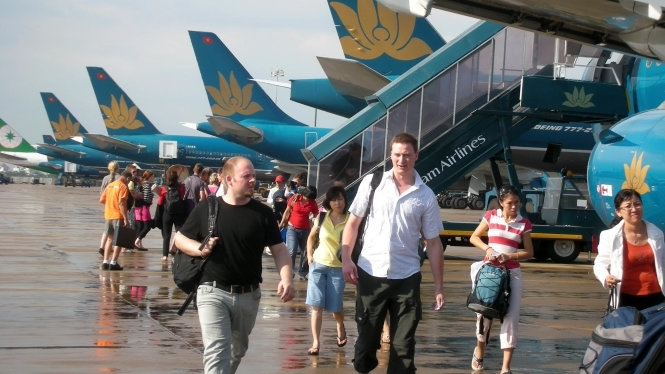
Dao Manh Luong, Head of the Ha Long Cruise Ship Association, at a forum on sustainable tourism recovery held recently, once again mentioned the serious problems that fleets of 500 ships of 245 member companies are facing.
“Ship owners are all getting financially exhausted. In order to exist, many of them have to borrow money from usurers. They have to spend VND200 million a month at least on ship maintenance and protection, which means VND1 billion for six months,” he said.
Since March 2020, Luong has spent VND4 billion to maintain eight cruise ships. He decided to sell some ships to maintain the remaining ones.
Quang Ninh is one of the first five localities open to tourists. However, it mostly receives guests in the province, while now is not the tourism season.
Many businesses still dare not reopen for fear for risks, lack of workers and lack of capital. In order to make the ships operational again, they will have to spend big money to repair them. Meanwhile, they have to satisfy strict requirements to receive guests.
Businesses also find it very difficult to access support packages because of complicated administrative procedures, and if they can access the packages, the support is not enough to help them overcome difficulties.
Luong said businesses can satisfy the requirements to borrow money from the packages to resume business, but don’t have reports confirming final settlements of taxation bodies. Nearly 100 percent of ship owners don’t have this document, because they don’t have clients and don’t have revenue.
As for the package which provides loans to pay workers, less than six percent of ship owners are eligible for these because they don’t have documents certifying that business owners have paid social insurance premiums until the time of borrowing.
Of the 245 members of his association, only 14 businesses can satisfy the requirement, which means only 174 out of 4,000 workers could get support.
“If businesses had money to pay social insurance premiums for workers, they would not have had to ask for help,” he complained.
Nguyen Quy Phuong, Director of the Travel Department, said many policies on supporting businesses in the tourism industry have been launched, including the extension of VAT (value added tax), PIT (personal income tax) and CIT (corporate income tax) payment deadline as well as the land rent payment. They also offered a 15 percent land rent reduction in 2020 and 30 percent reduction in 2021. Also, the firms can enjoy VAT reduction and electricity bill reductions.
However, it’s still very difficult for businesses to resume operation.
Phuong said the Vietnam National Administration of Tourism (VNAT) has asked the Ministry of Planning and Investment (MPI), which is drafting a new aid package for businesses hit by the pandemic, to design additional support to businesses and workers in the tourism industry. The support could be an extension of the tax and fee remission period and loosening of requirements for businesses to receive support.
| Travel firms are concerned about the inconsistency of policies. The unpredictability makes it impossible to plan their business. |
VNAT has also proposed a 50 percent Personal Income Tax reduction for transportation, accommodations, eatery services and tourist agents, and a preferential interest rate of 3 percent for 30 unsecured month-month loans. Also, VNAT wants an excursion fee exemption at attractions to help stimulate travel demand.
Changing policies
Vu The Binh, Deputy Chair of the Vietnam Tourism Association (VTA), commented that Vietnam’s tourism entered a new state after Resolution 128 was released, which stated that Vietnam needs to ‘live together with Covid’.
The most important factor is consistency in policies applied by all localities, to make it clear to domestic and foreign travelers that Vietnam pursues a single principle of ensuring safety, he said. The administrative procedures applied by different localities, from border gates to tourism sites, need to be consistent.
However, some provinces want to open their doors immediately to tourists, while others want to keep the doors closed to better prevent the coronavirus spread.
In principle, localities need to follow the central government in taking actions, and the policies must be stable.
A CEO of a travel firm said the biggest fear is the change of policies, i.e. travel firms are told to open today and asked to close their door tomorrow.
Vietravel Holdings President Nguyen Quoc Ky said Resolution 128 provides necessary conditions, but the tourism sector needs sufficient conditions as well. Four levels of on/off business have been set, but there have been no associated plans, which may lead to a lack of synchronization between localities, thus affecting travel business.
Ky said that while the central government is persistent with the ‘living together with Covid’ principle, some localities still follow ‘zero Covid’ strategies and have set technical barriers.
He stressed that policies need to be stable for a long period and be consistent to make it possible for enterprises to draw up their business plans.
Ngoc Ha

Vietnam to receive first Thai tourists in December
The first Thai travelers may arrive in Vietnam in December and Vietnamese would be able to travel abroad as part of an official tourism bubble established between the countries.

First foreign tourists return to Vietnam after two years
Vietnam has welcomed hundreds of foreign tourists after two years of closure due to the Covid-19 pandemic.
